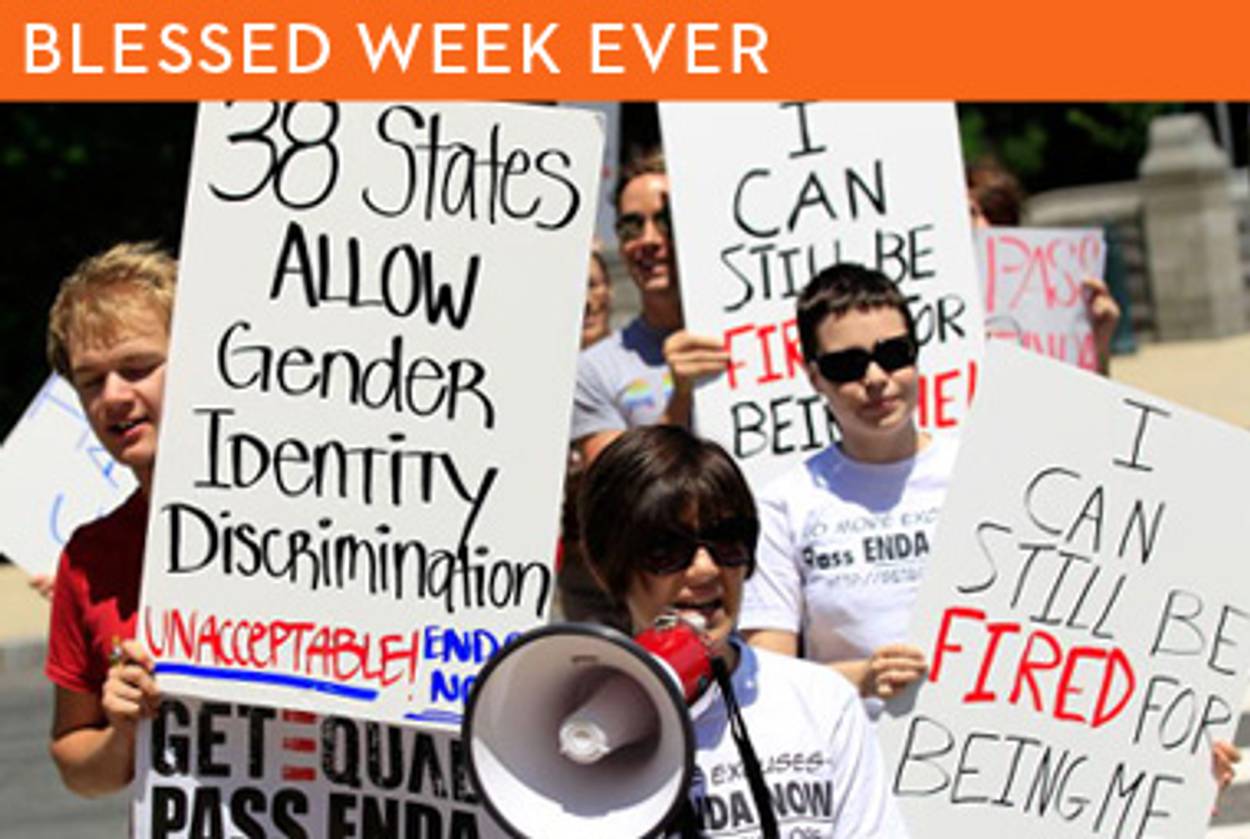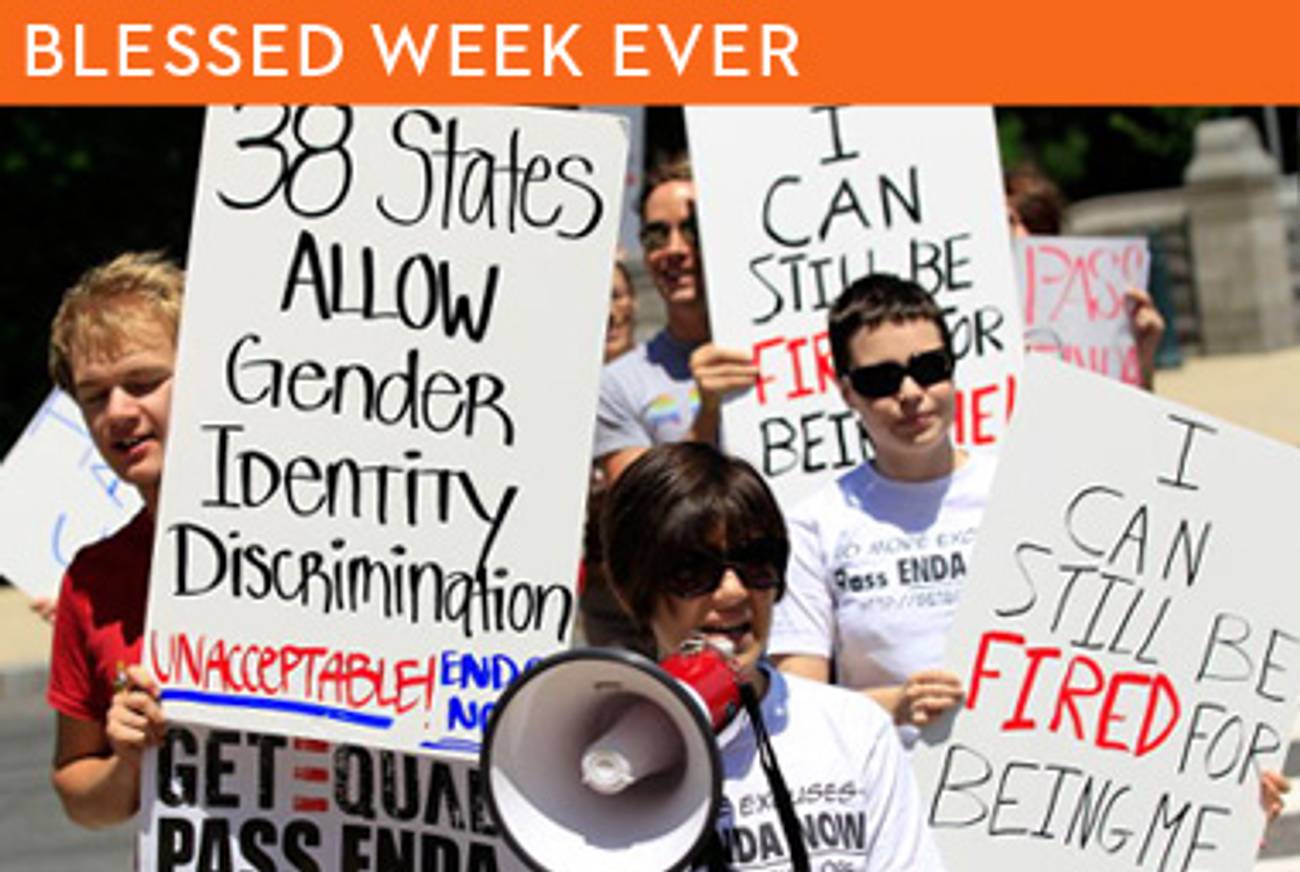Office Politics
This week’s parasha is proof that even God changes his mind. Congress must do the same and finally pass legislation prohibiting workplace discrimination based on sexual orientation.




The vote in the New York State Senate last month that will lead to the legalization of same-sex marriages in the state deserves a prominent page in the annals of American politics: It marks one of very few occasions of politicians admitting to having changed their minds.
Usually, any sign of cognitive progress among elected officials is greeted with derision. Tracking the etymology of the term “flip-flopping,” the late William Safire found evidence of the phrase being in use as early as the 1880s. Sometimes referred to as “somersaulting,” any deviation from previously stated dogmas was seen—then as now—as the ultimate signifier of political perfidy.
Which is why, the Sunday after the vote, State Sen. Mark J. Grisanti felt the eyes of fellow congregants at Buffalo’s St. Rose of Lima Catholic Church silently stabbing him in the back. A Republican representing a largely Democratic district, Grisanti had previously vowed that he would remain unalterably opposed to same-sex marriage; when time came to pass the legislation, however, his opposition—along with that of three other Republican lawmakers—was altered. “I cannot legally come up with an argument against same-sex marriage,” he said before voting yes. “Who am I to say that someone does not have the same rights that I have with my wife?”
Ann Deckop, sitting across the aisle from Grisanti at church that Sunday, was not convinced. “I voted for him,” she told the New York Times, “and I’m writing a letter indicating that I will not be voting for him in the next election.”
As Grisanti may soon learn, Deckop is not alone among Republican voters. As a recent Gallup poll found, while support for same-sex marriage jumped 9 percent among all likely voters during the previous year—and 13 percent among self-described Democrats—Republicans remain unfazed, with 72 percent of them still in opposition, exactly the same number as last year. Republicans, God bless them, aren’t fond of changing their minds.
God, as it happens, is: In this week’s parasha, he happily reverses his position on gender-based land ownership, bringing about a major coup of social legislation. The story begins with the five daughters of the deceased (and unimprovably named) Zelophehad petitioning Moses. “Our father died in the desert,” they say, “and he had no sons. Why should our father’s name be eliminated from his family because he had no son? Give us a portion along with our father’s brothers.”
Moses is confused. According to the Lord’s commandments, a portion—meaning a plot of land—could be distributed only to a man’s sons in the event of his demise or, if he had no sons, to his brothers. Unsure of what to do with the unusual request before him, Moses takes it up with the Lord. Without thinking too much, God replies: “Zelophehad’s daughters speak justly. You shall certainly give them a portion of inheritance along with their father’s brothers, and you shall transfer their father’s inheritance to them. Speak to the children of Israel saying: If a man dies and has no son, you shall transfer his inheritance to his daughter.”
This is the very model of the ultimate lawmaker: Compassionate, attentive, ready to address private suffering by passing universal edicts, and unafraid to reconsider an earlier decision in light of shifting consequences. That’s politics as they ought to be.
Unfortunately, we’re still far from the divine ideal. While New York’s recent legislation represents a major achievement, lesbians, gays, bisexuals, and transgendered individuals are still fighting an uphill battle. Like the daughters of Zelophehad, they’re more likely to face peril when it comes to making a living: While the number of companies that prohibit discrimination based on sexual orientation continues to rise—the number of Fortune 500 companies that earned top marks from the Human Rights Campaign Foundation’s Corporate Equality Index, a leading benchmark of workplace equality, shot from 13 in 2002 to 305 last year—there’s still no federal legislation in place to safeguard this most basic of rights.
Not for lack of trying: Every Congress since 1994 has been presented with some version or another of the Employment Non-Discrimination Act, a bill that would prohibit discrimination against employees on the basis of their sexual orientation or gender identity by companies of organizations with 15 employees or more, religious institutions excluded. It has failed each time, dying once in the Senate Committee on Labor and Human Resources, another time in the House Subcommittee on Employer-Employee Relations, a third in the House Subcommittee on the Constitution, Civil Rights and Civil Liberties, and so on, mostly due to fierce opposition from Republican lawmakers. Another iteration of the bill is currently under consideration in various committees, with President Barack Obama’s explicit support.
It’s as necessary as ever. According to Degrees of Equality: A National Study Examining Workplace Climate for LGBT Employees, released in 2010 by the Human Rights Campaign, 51 percent of gay or transgendered workers still feel compelled to hide their sexual orientation at work, and 58 percent report being occasionally subjected to derogatory comments.
If Republican voters, who traditionally profess a stronger affinity to religious faith, want to do something truly godly, they should follow the spirit of this week’s parasha and learn to change their minds. We must fully—and federally—protect the rights of all Americans to be who they are, not only at the altar but also, and more important, in the office.
Liel Leibovitz is a senior writer for Tablet Magazine and a host of the Unorthodox podcast.
Liel Leibovitz is editor-at-large for Tablet Magazine and a host of its weekly culture podcast Unorthodox and daily Talmud podcast Take One. He is the editor of Zionism: The Tablet Guide.